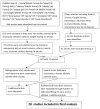Longitudinal associations between sleep duration and subsequent weight gain: a systematic review
- PMID: 21784678
- PMCID: PMC3202683
- DOI: 10.1016/j.smrv.2011.05.005
Longitudinal associations between sleep duration and subsequent weight gain: a systematic review
Erratum in
- Sleep Med Rev. 2012 Oct;16(5):491
Abstract
Objective: To systematically examine the relationship between sleep duration and subsequent weight gain in observational longitudinal human studies.
Methods: Systematic review of twenty longitudinal studies published from 2004-October 31, 2010.
Results: While adult studies (n = 13) reported inconsistent results on the relationship between sleep duration and subsequent weight gain, studies with children (n = 7) more consistently reported a positive relationship between short sleep duration and weight gain.
Conclusion: While shorter sleep duration consistently predicts subsequent weight gain in children, the relationship is not clear in adults. We discuss possible limitations of the current studies: 1) the diminishing association between short sleep duration on weight gain over time after transition to short sleep, 2) lack of inclusion of appropriate confounding, mediating, and moderating variables (i.e., sleep complaints and sedentary behavior), and 3) measurement issues.
Copyright © 2011 Elsevier Ltd. All rights reserved.
Figures
References
-
- CDC. Halting the epidemic by making health easier: at a glance 2010. Atlanta: Centers for Disease Control and Prevention; 2010.
-
- Marshall NS, Glozier N, Grunstein RR. Is sleep duration related to obesity? A critical review of the epidemiological evidence. Sleep Medicine Reviews. 2008;12:29–298. - PubMed
-
- Chen X, Beydoun MA, Wang Y. Is sleep duration associated with childhood obesity? A systematic review and metanalysis. Obesity. 2008;16:265–74. - PubMed
Publication types
MeSH terms
Grants and funding
LinkOut - more resources
Full Text Sources



